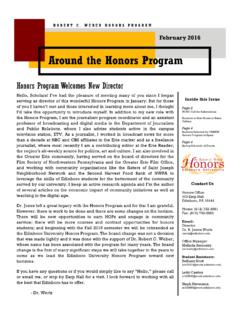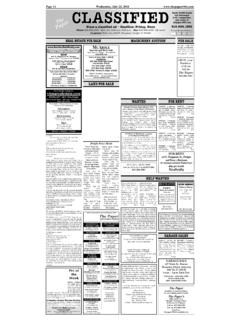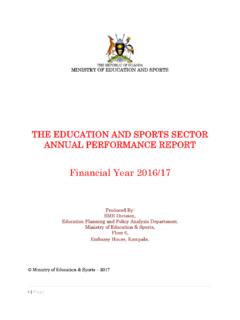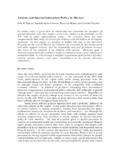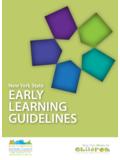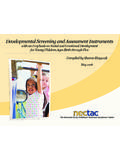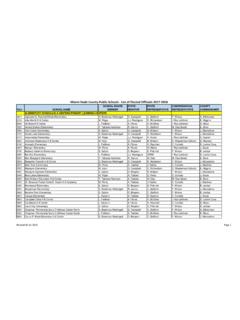Transcription of A M o n o g r A p h Early Childhood Education in …
1 1 Early Childhood Education in rural communities : Access and Quality IssuesEarly Childhood Education in rural communities : Access and Quality Issues 1 Frederick D. Patterson Research InstituteEarly Childhood Education in rural communities : Access and Quality IssuesA MonogrAphEdited by Doris Terry Williams and Tammy L. Mann2 Early Childhood Education in rural communities : Access and Quality IssuesEarly Childhood Education in rural communities : Access and Quality Issues 2 Frederick D. Patterson Research InstituteEarly Childhood Educationin rural communities :Access and Quality IssuesEdited by Doris Terry Williams and Tammy L.
2 MannA MonogrAph3 Early Childhood Education in rural communities : Access and Quality IssuesEarly Childhood Education in rural communities : Access and Quality Issues 3 Doris Terry Williams, School and Community TrustTammy L. Mann, D. Patterson Research Institute Copyright 2011 Frederick D. Patterson Research Institute8260 Willow Oaks Corporate Drive Box 10444 Fairfax, VA 22031-4511 Phone: (703) 205-3400 Fax: (703) 205-3574 Email: photo credits: Top left - iStockphoto, Karen Struthers; Middle - iStockphoto, Konradlew; Bottom left - iStockphoto, AlanLagadu; Bottom right - iStockphoto, CEFutcherSuggested citation: Williams, , & Mann, (Eds.)
3 (2011). Early Childhood Education in rural communities : Access and quality issues. Fairfax, VA: UNCF/Frederick D. Patterson Research InstituteAcknowledgements: This project was made possible through a grant from Pew Center on the States/The Pew Charitable Trusts. 4 Early Childhood Education in rural communities : Access and Quality IssuesEarly Childhood Education in rural communities : Access and Quality Issues 4 From Early Childhood to Higher Education : Fostering Connections Across the Education Continuum in rural communities to Improve Child and Youth OutcomesTammy L.
4 Mann and Doris Terry WilliamsRural Disparities in Baseline Data of the Early Childhood Longitudinal StudyCathy Grace, Martha Zaslow, Brett Brown, Dena Aufseeser, Lynn BellFactors Influencing rural Families Child Care Placement Decisions: A Literature ReviewMary BratschBertie County, NC: A Case Study in rural Early Childhood Education UtilizationJereann King Johnson Dilemmas of Belonging: Balancing Loyalty to Home With Desire to SucceedDeborah BrownPreparing Culturally Responsive rural Early Childhood Educators: Infusing Diversity Into Multiple Course WorkLydia Nganga Peggy LaughlinRighting a Wrong: rural Early Childhood Education in South AfricaJaneula M.
5 Burt120467099119146 ContentsSECTION ISECTION IISECTION III1 Early Childhood Education in rural communities : Access and Quality IssuesEarly Childhood Education in rural communities : Access and Quality Issues 1 From Early Childhood to Higher Education : Fostering Connections Across the Education Continuum in rural communities to Improve Child and Youth OutcomesTammy L. Mann and Doris Terry WilliamsChapter 1n 1996, UNCF established the Frederick D. Patterson Research Institute (FDPRI) to study barriers and facilitators of educational attainment, largely for African Americans.
6 Since FDPRI s founding, the institute has produced a wide variety of reports on these issues across the preschool to postsecond-ary Education continuum. This monograph underscores our continued inter-est in working across the Education pipeline to ensure that greater numbers of underrepresented minorities have access to educational opportunities that increase the odds of later success, academically and other-wise. There are many reasons why an organization that has devoted more than 65 years to improving college access and success would be interested in Early child-hood Education .
7 Chief among them is our growing desire to strengthen the pipeline of underrepresented minorities who graduate high school prepared Tammy L. Mann, , is the Executive Director of the Frederick D. Patterson Research Institute at UNCF and Doris T. Williams, , is Executive Director, rural School and Community Trust. The views and opinions in the article reflect those of the authors. UNCF acknowledges the support of the Pew Center on States/Pew Charitable Trusts for grant funding that facilitated making this monograph possible. For further on the Frederick D. Patterson Research Institute, please contact Tammy Mann at or visit For information on the rural School Community Trust, please visit Early Childhood Education in rural communities : Access and Quality IssuesEarly Childhood Education in rural communities : Access and Quality Issues 2 to enter and succeed in postsecondary Education .
8 As this paper will later describe, many of the students enrolled in private historically black col-leges and universities (HBCUs) come to them from Education experiences in states where significant numbers of children live in rural communities and where there are high rates of concentrated poverty, especially for African Americans. Thus, we have a keen interest in assessing the availability and quality of preschool Education . The authors believe, and the data support, that when children and youth have high-quality prekindergarten to Grade 12 (PK 12) educational experiences, they are more likely to leave school ready for postsecondary learning opportunities.
9 Consider the recent report by Marietta (2010) that chronicled changes over time in Montgomery County, Maryland, where a strong commitment, followed up by years of strategic planning and imple-mentation, is beginning to demonstrate the power of an aligned PK 12 edu-cation plan. Data over the course of 6 years (2003 to 2009) reflect increased rates of reading proficiency, as measured by performance on the Maryland State Assessment, in Grades 3 and 5. While gaps were still evident when the data were disaggregated by race and ethnicity, results demonstrated that the gap narrowed and performance improved.
10 One essential component of the Maryland plan involved developing a framework that outlined seven keys to college readiness, milestones that, if accomplished, would have the potential to increase the number of students leaving school prepared for college. Currently, too few young people, especially low-income and under-represented minorities, have that chance. If we are to alter this outcome, more attention must be devoted to improving alignment and integration across the PK 12 pipeline and building connections between home and school, beginning in the earliest years of a child s life.

